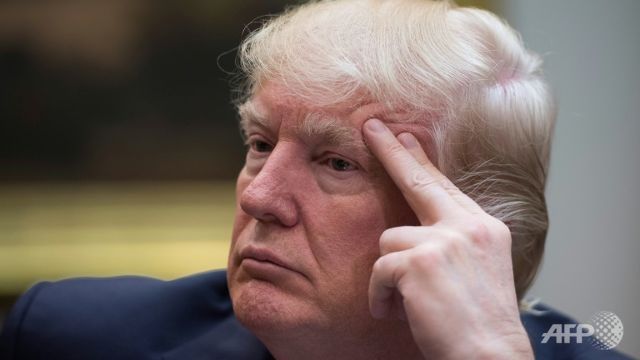Trump pivots to tax reform after Obamacare shipwreck
 |
| President Donald Trump. (Photo: AFP/JIM WATSON) |
"Health care is a very, very complicated issue. In a way (taxes are) a lot simpler," Treasury Secretary Steven Mnuchin said Friday (Mar 24).
And Vice President Mike Pence said Saturday that lawmakers should be shown details soon.
Several days before the collapse of Republican efforts to repeal and replace the Affordable Care Act, the Obama administration's signature health care law, President Donald Trump even promised to advance "the biggest tax cut since Ronald Reagan," saying it would be "fun."
But reshaping the entire tax code, something not done since 1986, is no mean feat. Several presidents, Republican and Democrat, have failed, foundering on procedural hurdles and the delicate compromises needed to succeed.
White House spokesman Sean Spicer said Monday the timing of changes will depend on reaching a grand bargain.
"I think part of this is going to be dependent on the degree to which we can come to consensus on a lot of big issues," he told reporters.
"DON'T HOLD ME TO IT"
Major US stock markets have also been jittery since the Obamacare repeal started to head south, despite rallying to multiple records since Trump was elected.
"Failure to pass health care reform has markets questioning the viability of US President Trump's ambitious fiscal stimulus plans," wrote Christopher Vecchio, a currency strategist at foreign exchange trading site DailyFX.
Part of the problem is policymakers had expected revenue savings from the Obamacare repeal would partly offset planned tax cuts. Indeed, Republican leaders insist that fiscal reforms be "revenue neutral," that is, that they not expand the federal budget deficit.
Paul Ryan, the Republican speaker of the House of Representatives, conceded that the failure on health care "does make tax reform more difficult, but it does not make it impossible."
The Trump administration first expects to cut corporate taxes in order to boost economic activity and encourage multinational companies to return to the United States and stimulate hiring.
During his campaign, Trump had promised to slash the corporate tax rate from 35 per cent to 15 per cent, but Mnuchin did not specifically reaffirm that commitment on Friday, mentioning only a much lower corporate tax rate.
To make up for the revenue loss from a corporate tax cut, Ryan is supporting a border adjustment tax. Generating an estimated US$1 trillion, the measure would impose a 20 per cent tax on some imports while supposedly reducing the trade deficit and encouraging companies to produce goods in the United States.
But the proposal is hotly contested, in particular by major retailers and Republican lawmakers who fear consumers will be stuck with rising prices. The Republican party has also historically favored free trade.
As for income, the White House favors cutting middle class taxes and reducing the number of tax brackets from seven to three (10 per cent, 20 per cent and 25 per cent).
The Treasury Secretary, who had so far promised that there would be no tax cuts for the wealthiest - with any tax cut for the top earners offset by eliminating deductions - seemed less certain during a live interview with the Axios news site.
"Don't hold me to it at the penny but that is the direction we are heading," Mnuchin said.
Senator Chuck Schumer, the leader of the Democrats in the Senate, said regressive tax cuts were a no-go.
If tax cuts favor "the middle class and the poor... we could work with them," Schumer said. "I don't think they are headed in that direction."
One of the ideas underpinning the Trump plan, known as "dynamic scoring," rests on the belief that tax cuts will pay for themselves by stimulating consumer spending and growth.
The Trump administration expects the economy to grow at three percent, if not 3.5 per cent, next year instead of the softer two percent recorded since 2010.
What the stars mean:
★ Poor ★ ★ Promising ★★★ Good ★★★★ Very good ★★★★★ Exceptional
Latest News
More News
- Russian President congratulates Vietnamese Party leader during phone talks (January 25, 2026 | 09:58)
- Worldwide congratulations underscore confidence in Vietnam’s 14th Party Congress (January 23, 2026 | 09:02)
- Political parties, organisations, int’l friends send congratulations to 14th National Party Congress (January 22, 2026 | 09:33)
- 14th National Party Congress: Japanese media highlight Vietnam’s growth targets (January 21, 2026 | 09:46)
- 14th National Party Congress: Driving force for Vietnam to continue renewal, innovation, breakthroughs (January 21, 2026 | 09:42)
- Vietnam remains spiritual support for progressive forces: Colombian party leader (January 21, 2026 | 08:00)
- Int'l media provides large coverage of 14th National Party Congress's first working day (January 20, 2026 | 09:09)
- Vietnamese firms win top honours at ASEAN Digital Awards (January 16, 2026 | 16:45)
- ASEAN Digital Ministers' Meeting opens in Hanoi (January 15, 2026 | 15:33)
- ASEAN economies move up the global chip value chain (December 09, 2025 | 13:32)
















 Mobile Version
Mobile Version